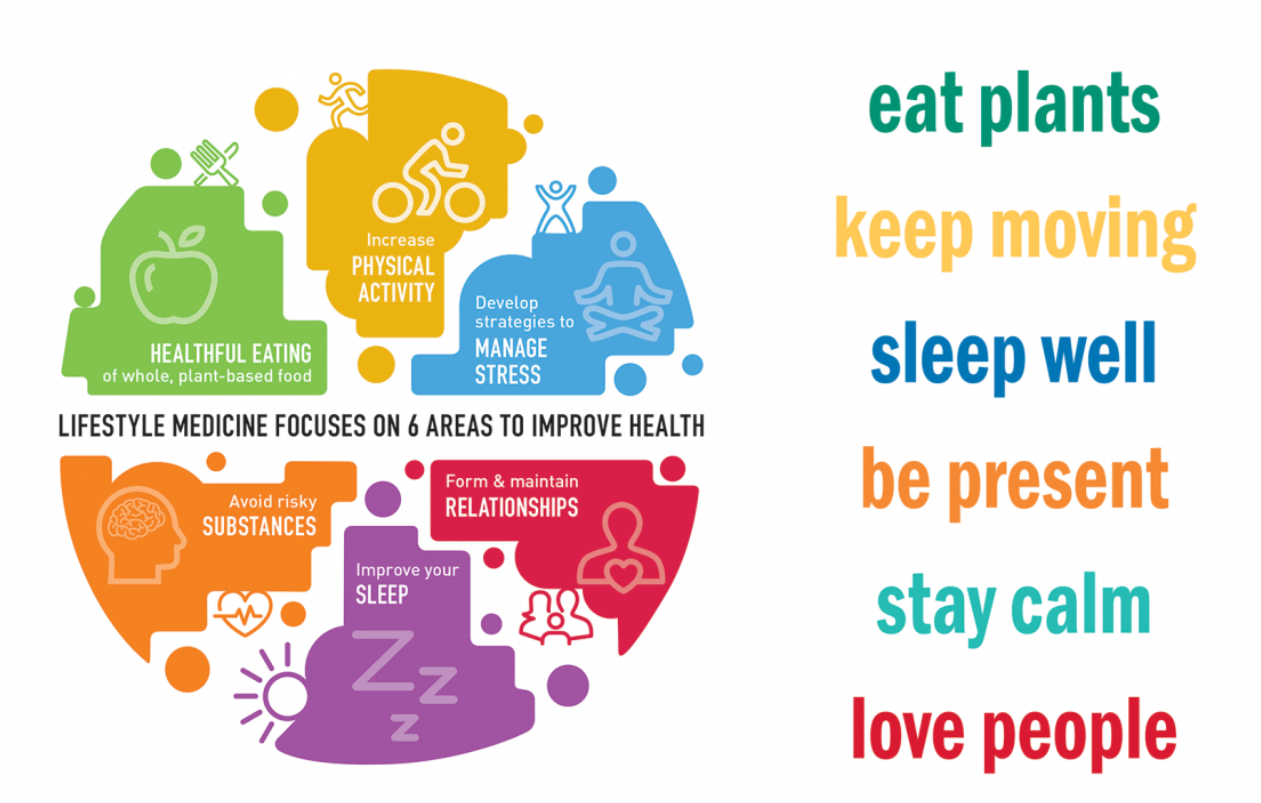What is lifestyle medicine?
What is lifestyle medicine and why is it important?
70% of all presentations to general practice are thought to be related to personal lifestyle choice with, around 80% of premature deaths attributed to these lifestyle related factors - poor diet, inactivity and tobacco. Identical twin studies have shown that 10% of chronic medical problems can be contributed to genetics. This is great news as it gives us the power to modify our health destiny.
Lifestyle medicine uses a holistic approach to health incorporating health promotion, disease prevention and chronic disease management. It is used to help individuals and families adopt and sustain healthy behaviors that affect health and quality of life. It is an evidence based approach, incorporating the best scientific information available.
“Lifestyle Medicine is the use of evidence-based lifestyle therapeutic intervention—including a whole-food, plant-predominant eating pattern, regular physical activity, restorative sleep, stress management, avoidance of risky substances, and positive social connection—as a primary modality, delivered by clinicians trained and certified in this specialty, to prevent, treat, and often reverse chronic disease.”
Lifestyle Medicine focuses on the six main pillars of personal health
healthful eating- whole foods, mostly plants
increase physical activity
restorative sleep
strategies to manage stress
avoidance of risky substances
enhanced social connections
As well as considering the broader factors that impact an individuals’ health and well-being. Poverty, health inequality, social isolation, loss of culture and identity as well as looking after the health of our planet. These factors are all interwoven and influence each other, so we need to be looking at the big picture to improve our happiness and vitality.
From the American College of Lifestyle Medicine (ACLM)
Common Questions
Is lifestyle Medicine different to conventional medicine?
No, Lifestyle Medicine is more the foundation of conventional medicine. Almost all clinical practice guidelines for the top chronic disease support Lifestyle Medicine as the first line of treatment.
Is Lifestyle medicine new?
Lifestyle Medicine is an exciting new global movement for change in health, healthcare, society and environment. The concept of looking after your health by living healthfully is not new, stemming back hundreds of years and cultures. Unfortunately most medical students and physicians do not receive adequate training in the basics of lifestyle medicine. This has lead to most health professionals treating chronic disease the same way they treat communicable disease: with pills and procedures. While this might temporarily relieve acute symptoms, it often does not address the underlying cause of the chronic disease.
What parts of health can Lifestyle Medicine be used for?
At an individual level Lifestyle Medicine focuses on areas of health that are affected by lifestyle factors i.e. diet, exercise, smoking etc. The majority of these are considered chronic diseases such as heart disease, stroke, diabetes, obesity, cancer, mental health, respiratory conditions such as COPD, musculoskeletal conditions such as gout and some autoimmune diseases. Lifestyle factors also affect other underlying areas of health such as immunity, stress levels and happiness.
At a broader level Lifestyle Medicine also aims to improve health at a societal level – to address the ‘upstream’ causes of chronic, lifestyle-related disease such as deprivation, health inequality, social isolation and a lack of community.
DO I STILL SEE MY REGULAR DOCTOR?
Yes. Lifestyle Medicine physicians complement, not replace, the care you receive from your primary care provider or specialist. We work together with all members of your healthcare team. Lifestyle Medicine recognizes the need for, and the continued importance of, other therapeutic interventions in healthcare including surgical and pharmaceutical where these are determined to be necessary, appropriate and effective. Where it has the proven potential to have a significant impact, however, lifestyle medicine needs to be a greater part of the healthcare picture.
““The doctor of the future will give no medication but will interest his patients in the care of the human frame, diet and in the cause and prevention of disease””



